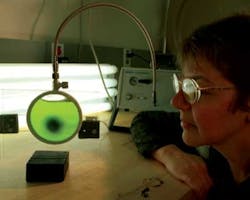New High Speed Blowers Feature Magnetic Bearings
Anew line of high speed centrifugal blowers using magnetic bearing technologies was developed in 2010 in part as a reaction to the growing importation of foreign high speed air-foil bearing blowers being sold into the U.S. water market.
The new blowers were developed using the combined expertise of engineers from Gardner Denver labs in Quincy, IL, and Hoffman headquarters in Peachtree City, GA.
“High-speed blower imports, using air-foil bearings, could in certain applications, provide energy-savings of interest to the customer,” said Wes Carl, Hoffman’s Director of Centrifugal Technology. “We didn’t feel, however, that the air-foil bearing technology provided customers with the same level of reliability and robustness that we expect from Hoffman products.”
Air-foil bearings have surface wear during a routine start-up and prior to reaching normal operating speed. A “lift-off” speed is achieved at around 4-7,000 rpm as a wedge is formed between the bearing and shaft.
“The reliability issue with air foil bearings relates to the fact that aeration blowers are a start/ stop application. Every time the unit is started or the bearing “touches down” on shutdown, wear is taking place and that is going to limit the life of the bearing. Also, the basic plant environment has a practical level of contamination (dirt, dust) build-up that can impact this wear and the air foil bearing life,” said Dave Shanahan, Applications Engineering Manager at Hoffman.
Marketed under Gardner Denver’s Hoffman® brand of centrifugal aeration blowers, the new Revolution is an advanced energy management blower system. In addition to the active magnetic bearing technology, the blowers feature patented surge control technology, integrated human machine interface and programmable logic controller, factory prewired and tested in an ergonomically designed sound enclosure.
The first in this family of blowers, the R-200 and R-300, are capable of flows from 2,500-8,500 CFM and pressures from 3-15 PSIG.
The blower incorporates infinite life cycle active magnetic bearings driven by a permanent magnetic synchronous motor (PMSM), which is controlled by a current source inverter (CSI) type variable frequency drive (VFD).
In early 2010, Gardner Denver CEO and President, Barry L. Pennypacker, was adamant that the company not lose market share to the imported high-speed blowers.
“Our challenge was to launch a new product that would be more energy-efficient than the imports — while maintaining the integrity of the quality and reliability of the Hoffman brand,” said Brian Cunkelman, Gardner Denver Vice President for the Industrial Products Group.
“We are very proud that the combined engineering teams responded with vigor to the challenge and were able to design, test and introduce the Hoffman Revolution during the 4th Quarter of 2010 and exceed all the market requirements,” he said.
The engineering project team began with a “Voice-of-the-Customer” exercise.
“The market is asking for increased energy efficiency at partial loads while retaining multi-stage blower reliability standards,” said team member Tony Maupin.
In April 2010, a break-through was achieved by the engineering team.
“We discovered a U.S.- designed and manufactured magnetic bearing coupled with a high speed motor that was successful in the HVAC industry. With our design engineering, we felt we could turn this into the blower product the market was looking for,” Carl said.
At this stage, a group of 10 design engineers, mechanical engineers, electrical engineers, test engineers, packaging experts, controls experts, and cooling circuit experts was assembled.
“We gave everyone assignments and we were off to the races,” Carl said. “We did a lot of front-end analysis and concept simulation on this machine to optimize the design and reduce the time to market.”
Blowers pull ambient air and send it to the wastewater tanks or lagoons.
“The motors that drive the blowers tend to represent 50—75% of the total energy used at a wastewater plant,” according to Patrick James, the Hoffman Marketing Manager. An important focus was to be able to run at partial loads using a variable frequency drive (VFD).
The overall energy used by the equipment is a function of the individual efficiencies of the components (blower, motor, VFD, etc) that make up the package. The Revolution product uses a high efficiency permanent magnet motor and selecting the correct VFD technology was critical. A Current Source Inverter VFD is used which was determined as the best fit with the PMSM motor and provided the optimal package efficiency and reliability.
There are many situations where an older wastewater treatment station is looking to replace a couple of blowers with newer machines.
Proper selection and utilization of the Revolution can produce annual energy savings of over 20% versus an existing traditional arrangement. Recognizing these savings is achieved through an understanding of the characteristics of the system demand and how to best apply the technology. In working with the Hoffman sales personnel, these details can be reviewed and the best option for the specific plant can be determined.
For more information, visit www.hoffmanrevolution.com.

